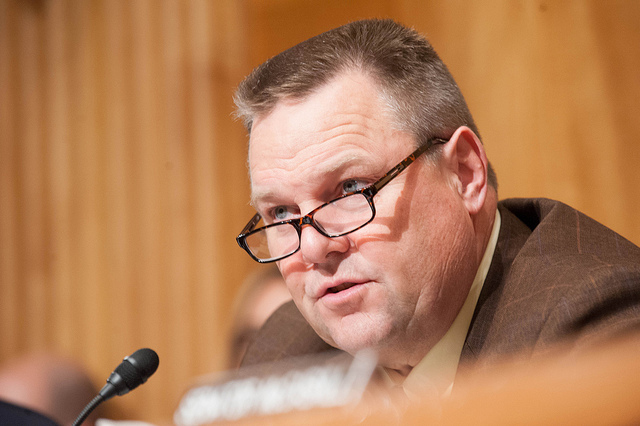
Senate Democrats are on the verge of helping Congressional Republicans scale back key banking regulations signed into law after last decade’s massive financial crisis.
Moderate liberals on the Senate Banking Committee are working with Chair Mike Crapo (R-ID) to hash out a proposal that would relax rules on speculation and oversight of some of the country’s largest banks.
Bloomberg reported on Tuesday that Sens. Jon Tester (D-MT), Joe Donnelly (D-IN), and Heidi Heitkamp (D-ND) are at the heart of efforts to revise the framework established in 2010 by Dodd-Frank financial reform.
The trio started engaging in talks with Crapo after negotiations broke down between the chair and the highest ranking Democrat on the committee, Sen. Sherrod Brown (D-Ohio).
“You’ll see when he introduces a bill the differences we have,” Brown told Bloomberg. “They want to do too much to help the bigger banks.”
According to the news service, the bipartisan partial repeal efforts are centered around changes to the Volcker Rule and the asset size at which the Systemically Important Financial Institution (SIFI) designation is triggered. A draft could be released as early as this week.
The Volcker Rule was written to prevent banks from financing purely speculative investments with publicly-insured savings. It has thus far been enforced only once, in April, to levy $156 million in penalties on Deutsche Bank.
Influential Trump administration officials, meanwhile, are interested in raising the SIFI threshold from $50 billion in assets. Treasury Secretary Steve Mnuchin has said he wants Congress to increase the bar to $250 billion — a move that would see rules relaxed on 26 banks.
Dodd-Frank financial reforms have not yet been revised by Congress since the election of President Trump.
In June, the House of Representatives approved of rules that would change the Dodd-Frank framework in a major way. The so-called CHOICE Act passed with the support of every Republican except Rep. Walter Jones (R-NC)
Angry, shocked, overwhelmed? Take action: Support independent media.
We’ve borne witness to a chaotic first few months in Trump’s presidency.
Over the last months, each executive order has delivered shock and bewilderment — a core part of a strategy to make the right-wing turn feel inevitable and overwhelming. But, as organizer Sandra Avalos implored us to remember in Truthout last November, “Together, we are more powerful than Trump.”
Indeed, the Trump administration is pushing through executive orders, but — as we’ve reported at Truthout — many are in legal limbo and face court challenges from unions and civil rights groups. Efforts to quash anti-racist teaching and DEI programs are stalled by education faculty, staff, and students refusing to comply. And communities across the country are coming together to raise the alarm on ICE raids, inform neighbors of their civil rights, and protect each other in moving shows of solidarity.
It will be a long fight ahead. And as nonprofit movement media, Truthout plans to be there documenting and uplifting resistance.
As we undertake this life-sustaining work, we appeal for your support. Please, if you find value in what we do, join our community of sustainers by making a monthly or one-time gift.